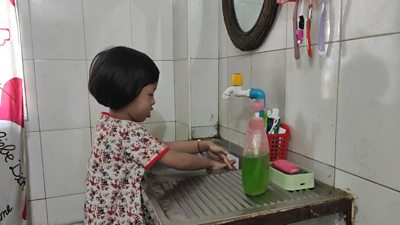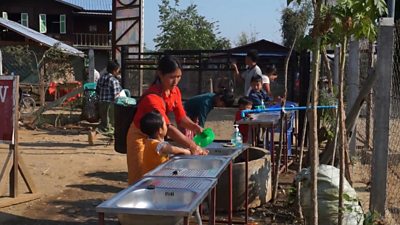Research summary
Published: January 2021
Feedback from a small-scale rapid audience assessment among families in Yangon, Myanmar, highlight that new sanitation and hygiene practices have formed since the COVID-19 outbreak. Family members encourage each other to take personal hygiene more seriously. Fathers are typically the least motivated to wash in the family but have demonstrated high willingness to change their behaviours during the pandemic for the sake of their family. Handwashing has become an act of service to shield loved ones from the threat of the virus.
If I don’t wash properly, it will impact my wife and child. Even though I don’t want to, I do it.
Context
While 79% of people in Myanmar have access to basic handwashing facilities, including soap and water the practice of frequent handwashing with soap is not widespread. During the COVID-19 outbreak there has been a range of communication from government, CSO and INGO actors targeting community behaviours to increase handwashing. These campaigns, however, often fail to utilise an evidence-based SBCC approach – which segments and targets key audiences, and which challenges barriers to action.
The project
As part of the COVID-19 response led by the Myanmar Ministry of Health and Sports (MoHS), ����ý Media Action will develop a pilot multi-platform campaign designed to improve family handwashing practices with support from the United Nations Children's Fund (Unicef). The project aims to promote safe handwashing practices to prevent infection and the spread of COVID-19 in Myanmar and encourage handwashing with soap as a lifelong habit. The pilot will produce content for radio, TV and digital audiences.
Research methodology
A rapid audience consultation was carried out by ����ý Media Action in December 2020 to inform the pilot content design. The aim was to explore knowledge, attitudes and practices related to hygiene and handwashing, how this might have changed during the COVID-19 period, and opportunities for influencing longer-term change in water, sanitation and hygiene (WASH) practices. First, a review of existing data and evidence was carried out to understand key information gaps to explore in the audience discussions. Then, six online focus group discussions were held with parents in Yangon (three groups of mothers, three groups of fathers). In addition, six in-depth interviews (IDIs) were conducted with primary and elementary school teachers.
Key findings
Families in Myanmar report following different routines for personal and household hygiene since the first COVID-19 outbreak. A new standard has been set for themselves and others. These changes are triggered primarily by fear of the virus.
Parents are taking hygiene more seriously because they worry about contracting COVID-19 and risking the health of their family. This increased attention is being passed on to children and parents are following strict measures to ensure their children wash regularly.
Above all else, handwashing has become an act of service for loved ones. Parents explained they practice new hygiene measures in a bid to ensure the safety and wellbeing of their family. But while families are washing more frequently, it isn’t always more thoroughly. Few parents reported following the recommended handwashing steps and felt that washing for 20 seconds throughout the day is unrealistic.
As the perceived risk of COVID-19 subsides, parents report feeling less motivated to continue these health practices. Families are divided on whether they expect to continue new routines post-pandemic. Several underlying factors influence healthy handwashing practices – namely a family’s economic status, resources and education level. However, a range of social and attitudinal factors are also at play.
I wash properly when my family members are around as a role model. If not, I will be shouted at by them.

Covid is positive in terms of learning about handwashing.
Feedback from parents and teachers highlighted a clear gender divide in hygiene and handwashing norms, starting from a young age and continuing into adulthood. Teachers explained that girls closely follow handwashing instructions taught in class, while boys are less likely to prioritise handwashing in favour of other activities, or more easily forget to wash at key times.
As adults, gender norms place responsibility on women for household cleanliness, hygiene, and dependents, which means they wash their hands regularly as part of their daily routine. This has increased since the pandemic as mothers are particularly worried about the virus. Pre-pandemic, some fathers admitted that handwashing was not a priority within their daily routine. However, since the first outbreak, the gap between mothers’ and fathers’ sanitation attitudes and routines is closing, as fathers are taking personal and household sanitation more seriously.
Families influence each other’s handwashing practices. During the pandemic, family members have been reminding each other to follow recommended practices that will keep them safe. This includes handwashing, with children and caregivers prompting each other to wash more frequently. As such, making sustainable change to handwashing practices relies on full family efforts.
Children can be effective influencers within the family, both educating and reinforcing handwashing practices within their homes. Children have been particularly successful in encouraging fathers to improve their cleaning habits – more so than mothers.
However, teachers explained that many parents need education, resources and support to achieve longer-term change to WASH practices at home. Parents often lack knowledge of the correct methods and so struggle to encourage them among their children. Information designed specifically to help parents understand recommended steps, or visual aids that can be used within the home were some examples proposed by teachers to help families improve their handwashing habits.
Children follow the instructions of teachers at school. But if their parents do not do handwashing, children might not wash their hands because parents are their role models at home.
Implications
The rapid audience assessment highlights that new WASH practices have formed among families in Myanmar, providing an opportunity to create longer-term change to norms post-pandemic. As such, this is an opportunity for creative content in this pilot project to leverage those motivators and key influencers in order to sustain these practices. For example, content which aims to showcase family members influencing each other’s WASH practices could be effective, especially fathers who can play a key role in influencing and role-modelling and during the pandemic have shown high motivation to change their behaviours for the sake of their families. While the children can nudge their family, healthy household handwashing behaviours rely on parents’ attitudes, practices and resources.
